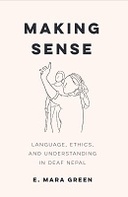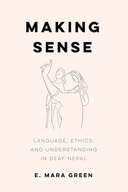Explore

Making Sense explores the experiential, ethical, and intellectual stakes of living in, and thinking about, a world in which language cannot be taken for granted. In Nepal, many deaf signers use Nepali Sign Language (NSL), a young, conventional signed language. The majority of deaf Nepalis, however, use what NSL signers call natural sign. Natural sign involves both conventional and improvisatory signs, many of which recruit semiotic relations immanent in the social and material worlds. These features make conversation in natural sign both possible and precarious, since sense-making depends on signers’ skillful use of resources and on addressees’ willingness to engage. Natural sign reveals the labor of sense-making that in more conventional language is carried by shared grammar. Ultimately, this highly original book shows that emergent language is an ethical endeavor, challenging readers to consider what it means, and what it takes, to understand and to be understood.
“Making Sense delves into the heart of what it means for people to understand each other when they cannot take communication for granted. It is one of the best ethnographic studies about deaf people and signing practices that I’ve read.” — Lina Hou, Assistant Professor, Department of Linguistics, University of California, Santa Barbara
“Beautifully organized and conceived, highlighting in depth the ethical dimensions of communication and understanding.” — Kristin Snoddon, Associate Professor, School of Early Childhood Studies, Toronto Metropolitan University
This book is included in DOAB.
Why read this book? Have your say.
You must be logged in to comment.

